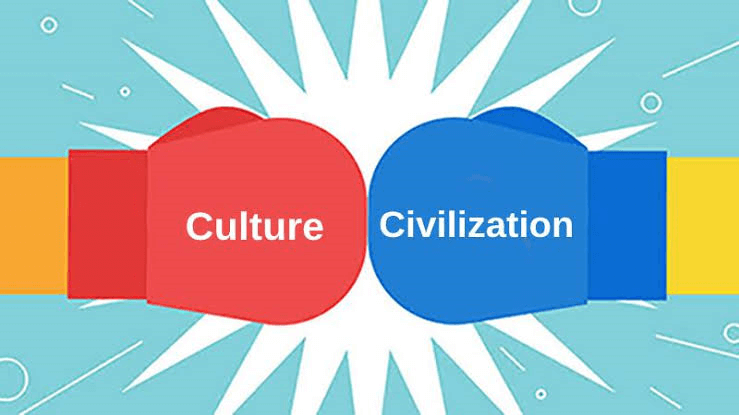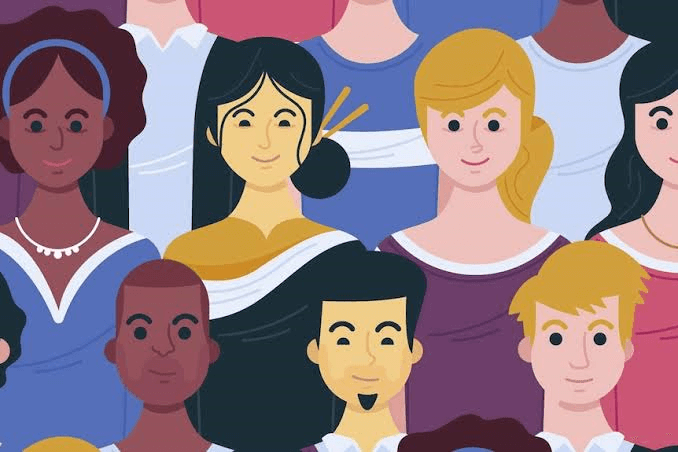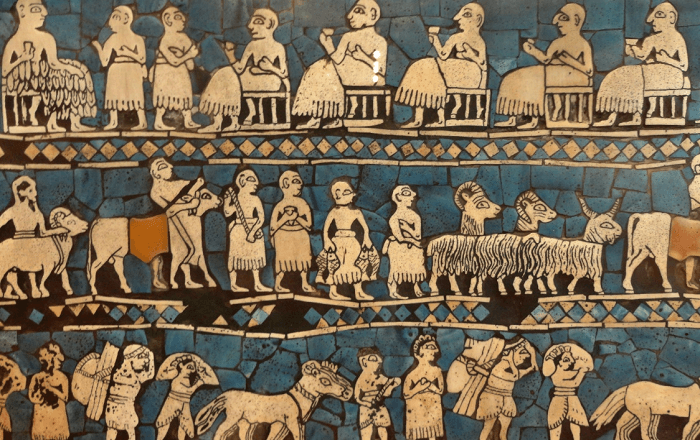Difference Between Culture and CivilizationIn everyday speech, the phrases culture and civilisation are sometimes used interchangeably. Yet, the term "civilization" describes a sophisticated manner of life that emerged as people started to create urban communities. Culture is a multifaceted concept that encompasses information, religion, beliefs, practices, laws, traditions, music, art, and other things. Culture is just one of the many intricate components that make up a civilisation. The major distinction among culture and civilization is this. 
CultureThe term "culture" is a general term that refers to social behavior, institutions, and norms present in human societies as well as the people that make up these groups as well as their knowledge, beliefs, and abilities. Culture is frequently said to have originated in or been influenced by a particular area or place. The diversity of cultures found in different communities is proof that people acquire culture through the processes of learning of enculturation and socialisation. As a set of rules for behavior, dress, language, and the manner in a given setting that serves as a model for expectations within a social group, cultural norms codify acceptable behavior in society. Accepting a homogeneous culturein a social group carries risks, just as a particular species can perish in the face of climate change due to a lack of physiological responses to the change. Due diligence, upholding one's honor, and remaining loyal to one's social group is therefore regarded as virtues or practical answers to conflict in military culture, whereas bravery is valued as typical conduct for an individual. Comparable traits can be found in a social group that practices religion. Reconstructing a society's cultural paradigm is referred to as cultural transformation or repositioning. Both internal and external forces that support and oppose change have an impact on cultures. Contact between societies has a direct impact on cultures. UNESCO and other organizations make an effort to protect the culture and cultural assets. 
When it comes to the many different phenomena that are passed down via socialization in human civilizations, culture is regarded as an important topic in anthropology. Every human society exhibits cultural universals. They include technological advancements like as tool use, cooking, housing, and clothing, as well as expressive forms such as art, music, dance, ritual, and religion. Technology, architecture, and art are considered physical expressions of culture under the concept of material culture. In contrast, a society's intangible cultural heritage is made up of immaterial cultural elements like mythology, philosophy, literature (both written and oral), and science. These immaterial cultural elements also include the principles of social organization, practices of political organization, and social institutions. A "culture," when used as a count noun, refers to the set of norms, values, and practices that define a society or community, such as an ethnic group or a country. A culture is a body of information developed over time. Multiculturalism places high importance on the peaceful coexistence and respect of the various civilizations that share our world. There are instances when the term "culture" is also used to refer to particular behaviors within a subgroup of a community, a subculture (such as "bro culture"), or a counterculture. Cultures cannot readily be ranked or evaluated objectively since any assessment must take into account the values of a particular culture, according to the ideology and analytical position of cultural relativism in cultural anthropology. Contact between societies has an external impact on cultures and has the potential to cause (or not) social change and alter cultural practices. Technology advancement or social dynamics may be impacted by conflict or struggle for resources. Moreover, through diffusion or acculturation, cultural ideas can spread from one civilization to another. Diffusion is the transfer of something's form from one culture to another, but necessarily it's content. For instance, as China expanded its economy to global trade in the late 20th century, Western restaurant chains including culinary brands aroused the curiosity and intrigue of the Chinese. The term "stimulus diffusion" (the exchange of ideas) describes the process through which a component of one culture inspires an invention or spreads to another. On the other hand, "direct borrowing" frequently refers to the diffusion of material or technological elements from one culture to the other. A model of innovation adoption by people and cultures based on research is presented by the diffusion of innovations hypothesis. In the humanities, the degree to which a person has developed particular expertise in the arts, sciences, education, or manners has been viewed as a cultural characteristic of that person. Moreover, civilizations and less advanced societies have occasionally been distinguished by their degree of cultural sophistication. These class-based divisions between such a high culture of a social elite and a low culture, pop culture, or folk culture of the lower classes?distinguished by the tiered access to cultural capital?also reflect such hierarchical attitudes on culture. Civilization
Any complex society defined by the growth of the state, social inequality, urbanization, and symbolic means of communication beyond naturally spoken language is referred to as a civilization or civilization. In addition, farming, construction, architecture, technical progress, taxation, regulation, and labor specialization are frequently used to describe civilizations. In the past, a civilization was frequently thought of as a greater and "more sophisticated" culture, in contrast to smaller, ostensibly less developed societies. In this broad meaning, a civilization compares with decentralized tribal communities, such as the cultures of nomadically herding livestock, Neolithic civilizations, or hunter-gatherer societies; yet, on occasion, it also differs from the civilizations found inside civilizations themselves. With a power elite and subordinated urban and rural populations that participate in agricultural production, mining, comparatively tiny manufacturing, and trading, civilizations are structured as densely inhabited communities. Power is centralized by civilization, which also increases human influence over other aspects of nature, including other people. The term "civilization," as its etymology indicates, was first connected to villages and cities. The earliest appearance of civilizations is typically correlated with the closing stages of the Neolithic Era in West Asia, which culminated in a relatively quick process of urban revolutions and state-building, a sociopolitical development linked to the creation of a ruling elite. During the French Revolution in the late 1700s and early 1800s, the word "civilization" was always used in the singular, to refer to the advancement of all humankind. In French, this is still the case. In the 19th century, "civilizations" was only sometimes used as a countable word, but in the later 20th century, it significantly increased in usage, sometimes simply denoting culture.Only in this broad sense is it conceivable to use the term "mediaeval civilization," which in Elias's meaning would have been absurd. Settlement patterns among civilizations differ significantly from those of other societies. Several definitions of "civilization" include "'living in cities'". Non-farmers frequently congregate in cities for employment and commerce. Civilizations possess a more intricate political system than other societies, particularly the state. Compared to other cultures, state systems are more stratified; the social classes diverge more. The majority of the surplus is in the authority of the ruling class, which is typically concentrated in urban areas. The ruling class imposes its will through the activities of a government or bureaucratic. Human cultures have been categorized by conflict theorist Morton Fried and integration theorist Elman Service according to their political structures and levels of social inequality. Differences Between Culture and CivilizationAbout the difference between culture and civilization, it's important to remember thefollowing:
ConclusionHence, it's important to distinguish between culture and civilization. But, both were made by people and reflect how we lived our lives. These two teach us the principles, values, and guidelines for leading honorable and opulent lives.
Next TopicDifference between
|
 For Videos Join Our Youtube Channel: Join Now
For Videos Join Our Youtube Channel: Join Now
Feedback
- Send your Feedback to [email protected]
Help Others, Please Share









